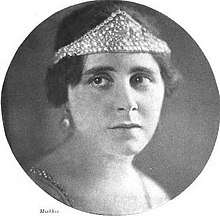Betty Callish
Betty Callish (August 24, 1886 – after 1941) was a Dutch-born actress, singer, and violinist who performed in Dutch, English, German, French and Italian.[1]. In 1941, as Roxo Betty Weingartner, she became a postulant of the Third Order Regular CSMV, a cloistered religious community at the Convent of St Thomas the Martyr in Oxford.
Betty Callish | |
|---|---|
 Betty Callish, from a 1906 publication. | |
| Born | August 24, 1886 Baarn, Holland |
| Died | after 1941 |
| Other names | Roxo Betty Weingartner, Betty Calisch, Betty Kalisch, Babette Callish |
| Occupation | actress, singer, violinist |
| Years active | 1905-1920 |
| Spouse(s) | Felix Weingartner (married 1922, divorced by 1931) |
Early life
Babette Calisch was born in Baarn, the daughter of Salomon Oreste Calisch and Aleida Oppenheim.[2] Her parents were Jewish;[3] her mother was a first cousin to Dutch feminist Aletta Jacobs. She knew Sarah Bernhardt from childhood,[1] and on her advice studied acting, learned to play the violin, and trained as a singer in Berlin.[3][4]
Career

She started acting in London, as a student at Herbert Beerbohm Tree's academy, now known as the Royal Academy of Dramatic Art. In England, Callish appeared Lady Ben (1905),[5] Leah Kleschna (1905),[6] The Little Stranger (1906),[7] A Waltz Dream (1911) and Orpheus in the Underground (1912).[8] She was also seen in London productions of The Laughing Husband and Sadie Love; she appeared in both these shows on Broadway, as well, in 1914 and 1915. She starred in The Great Lover (1916) in Chicago.[3][9] and in The King (1917-1918).[10][11] "She is a pretty soubrette," commented American critic Burns Mantle, "who both sings and plays violin – pleasantly but neither with surpassing skill."[12]
In 1941, after a divorce and a time in treatment for alcoholism, Betty Weingartner became a postulant at the Third Order Regular CSMV, a cloistered religious community at the Convent of St Thomas the Martyr in Oxford. There, she was known as "Marica".[13]
Personal life
Betty Callish married (in 1922) and divorced (by 1931) Austrian conductor Felix Weingartner; she was his fourth wife.[14] He dedicated a symphony to her during their marriage.[15] She was a confidante of Queen Marie of Romania.[16] She died after 1941.
References
- "Versatility is Synonymous with Miss Betty Callish". Morning Register. March 15, 1914. p. 15. Retrieved August 3, 2019 – via Newspapers.com.
- Genealogie, Coret. "Birth Babette Calisch on August 24, 1886 in Baarn, province Utrecht (Netherlands)". Open Archives. Retrieved 2019-08-04.
- de Valdor, Joseph (October 20, 1916). "Betty Callish -- Actress, Singer, Violinist". Music News. 8: 3.
- "People in the Play". The Play-Pictorial. 7: 140. 1906.
- "'Lady Ben' at the Comedy Theatre". The Academy. 68: 369–370. April 1, 1905.
- McLellan, C. M. S. (1920). Leah Kleschna: A Play in Five Acts. S. French. p. 5.
Betty Callish.
- "From Mr. Tree's Academy". The Sketch. 54: 177. May 23, 1906.
- Wearing, J. P. (2013-12-19). The London Stage 1910-1919: A Calendar of Productions, Performers, and Personnel. Scarecrow Press. ISBN 9780810893009.
- C. E. W. (October 27, 1916). "The Great Lover". Music News. 8: 41.
- White, Matthew Jr. (February 1918). "The Stage". Munsey's Magazine. 63: 122.
- "Cohan. 'The King'". Theatre Magazine. 27: 22. January 1918.
- Mantle, Burns (April 1914). "The Harassed Heroine". Munsey's Magazine. 51: 585.
- "1941". Mucknell Abbey. Retrieved 2019-08-03.
- "Champions: Felix Weingartner". The Hector Berlioz Website. Retrieved 2019-08-03.
- "Weingartner, Felix | Symphony No. 5 in C minor, op. 71 (1923-24)". Repertoire and Opera Explorer. Retrieved 2019-08-03.
- Critescu, Sorin (2018). Queen Marie of Romania Confessions 1914-1927. Tritonic. ISBN 9786067492965.
External links
- Betty Callish at the Internet Broadway Database
- A cigarette card featuring Betty Callish, in the George Arents Collection, New York Public Library